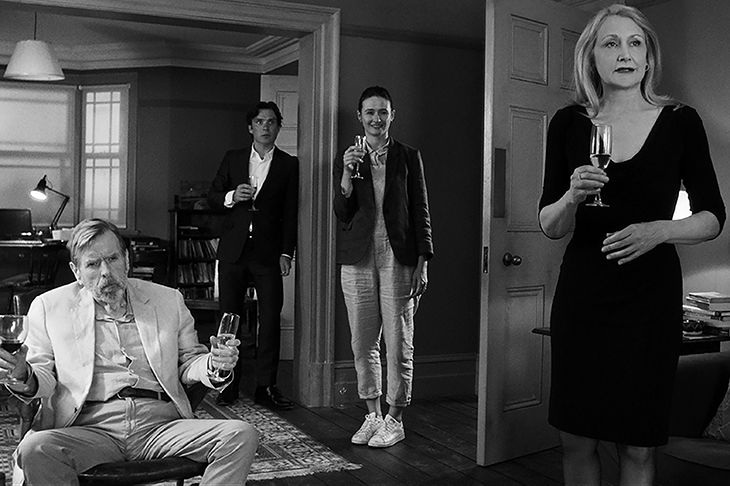Sally Potter’s The Party, which unfolds in real time during a politician’s soirée to celebrate her promotion, is just 71 minutes long, but it certainly packs a punch. Actually, make that two. Two punches (at least). And there’s a gun, cocaine, a smashed window, throwing up, toxic revelations (of course) and a tray of incinerated vol-au-vents. It is less than half the length of, say, Blade Runner 2049, but three times as dramatic, and maybe 676 times as entertaining, plus it features a stellar cast who put the work in and don’t discover stuff by simply staring at it really, really hard.
Filmed in black and white, which gives it the retro feel of an old Play for Today (but crisper), the film is said to be a satire on ‘broken Britain’ and ‘a state-of-the-nation commentary’, but you can see that or not see that or just half see it or even just glimpse it momentarily. It’s hard to know, in fact, what it is saying exactly, but at least it is trying to say something, and at least it is trying to say something briskly.
It begins with a hauntingly eerie guitar rendition of ‘Jerusalem’ (composed by Potter’s long-term musical collaborator, Fred Frith) as a dishevelled, flustered woman opens her front door and waveringly points a gun at a person as yet unknown. We then spool back in time to see that this is Janet (Kristin Scott Thomas), who, just an hour or so earlier, had been in her kitchen, taking phone calls congratulating her on her promotion to shadow health secretary as she’s preparing for the party. (That is, the party tonight, and also the party in a political sense, one assumes; it’s never specified that she’s Labour but it is intimated strongly.)
Meanwhile, her husband Bill (Timothy Spall), an academic, seems ominously unenthused as he sits in the other room listening to his vinyl in an almost catatonic state. (He does a lot of staring, admittedly.) As for the guests, they are Janet’s oldest friend April (Patricia Clarkson), a former activist and constantly wise-cracking cynic who admires Janet’s pinny as ‘post-modern, post-post-feminist’, which made me laugh, I have to say. Her partner is Gottfried (Bruno Ganz), a woo-woo, new-agey ‘lifestyle coach’ who would be beloved by April if only she didn’t hate him so much. Then there’s a lesbian couple, Martha and Jinny (Cherry Jones, Emily Mortimer), and Tom (Cillian Murphy), a sweaty, wired, coke-snorter who brings ‘Chekhov’s gun’ into the mix. Tom is a rich banker and represents everything all the others supposedly detest, but he is married to Janet’s colleague, Marianne, a gifted spin doctor who does not make an appearance as such but figures largely nonetheless.
One does not, as a rule, associate Potter, who wrote and directed, with the mainstream (Orlando, The Tango Lesson, Rage, Yes), but this takes the mainstream dinner-from-hell scenario (see also: Festen, Discreet Charm of the Bourgeoisie, Who’s Afraid of Virginia Woolf?… Doctor Foster!) and runs with it gleefully. Everyone is awful and everyone is harbouring a secret, and it all kicks off before dinner is even served, which is annoying. What would it have been after the vol-au-vents? Chicken in the basket? Stroganoff? (I seriously wished to know.) Swipes are taken at the NHS, feminism (‘sisterhood is a very ageing concept’, we’re told), western medicine, alternative therapies, parliamentary democracy and the comfortable life of the Islington socialist. They all skewer themselves, one way or another, and are forced to confront their self-deceptions, reappraise their ideals, significantly shift them.
It sounds a drag, but it’s wittier than this, with some cracking dialogue. ‘Tickle an aromatherapist and you’ll find a fascist,’ says April. I can’t say if this is true or not, definitively, but it certainly confirms my own long-held suspicion.
In normal circumstances, this would have the Credibility Police all over it — would April be with a man like Gottfried? Wouldn’t these secrets have come out earlier? Who makes vol-au-vents any more? — but it all happens at such a lick that credibility is not an issue. You just don’t have time to get hung up on it. The acting is full-on, very theatrical, and perhaps even, on occasion, too theatrical. But a too-theatrical Scott Thomas or Spall or Clarkson or Ganz or Murphy or Mortimer or Jones still has to be 892 times more entertaining than, say, that blank staring business. Like I said, I can’t tell you what it adds up to exactly, but it’s fun getting there, wherever that is.






Comments